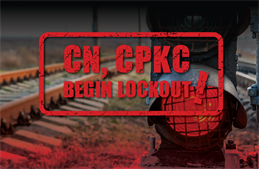"Throughout nearly a year of negotiations, CPKC has remained committed to doing its part to avoid this work stoppage. CPKC has bargained in good faith, but despite our best efforts, it is clear that a negotiated outcome with the TCRC is not within reach," it said in a separate announcement. "The TCRC leadership continues to make unrealistic demands that would fundamentally impair the railway's ability to serve our customers with a reliable and cost-competitive transportation service."
CPKC noted that at this time, the responsible path forward for the union, the company, our customers, the Canadian economy and North American supply chains and the public interest is for TCRC and CPKC to engage in binding arbitration to resolve all outstanding disputes.
"Binding arbitration is an effective, reasonable and fair process that ultimately has been used many times in the past to resolve disputes with this union," CPKC said as it reiterated its standing offer to resolve this matter through binding arbitration.
"Acceptance of that offer by the TCRC would immediately end this work stoppage and mitigate further harm and disruption to supply chains and our economy," it added, warning of "further uncertainty and the more widespread disruption" should this dispute drag out further resulting in a potential work stoppage occurring during the fall peak shipping period.
"Delaying resolution to this labour dispute will only make things worse," CPKC further said.
Nonetheless, CPKC noted that it is working closely with customers to execute a safe and structured shutdown of its train operations across Canada to enable CPKC to safely and efficiently resume full rail operations across the entire network once the work stoppage ends.
Flexport said the consequences of the rail stoppage are "huge." The shutdown is the result of months of tense negotiations between the railways and the 9,300 engineers, conductors and yard workers.
"The consequences are huge. Canada's railways move US$1 billion worth of goods daily, and this stoppage could severely disrupt supply chains across North America," the American supply chain management company added.
"The ripple effects could hit industries ranging from agriculture to manufacturing, impacting both the US and Canadian economies."
Canadian government vows action
Meanwhile, on Thursday, the Canadian government said it will soon announce its plans to address the nationwide freight rail stoppage.
This is the first time that both major Canadian railroads have simultaneously shut down due to a labour dispute. But unlike a strike, in which union members refuse to report to work, in a lockout, management is the one telling Teamsters members that they can't work.




